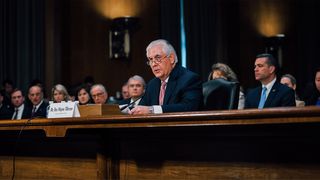Rex Tillerson will approach foreign policy very differently to US President Donald Trump. While Trump’s guiding principle is ‘America First’, Tillerson espouses an assertive vision of US global leadership. Unlike Trump, Tillerson believes NATO is indispensable, champions the benefits of US alliances, wants the United States to push back against Russian expansionism in Crimea, and does not oppose the Trans-Pacific Partnership (TPP). The incoming secretary of state has the foreign policy views of a traditional Republican; he is certainly not ‘Trump-lite’.
Yet Tillerson will enter office with “tremendous respect” from the incoming President.1 Trump has described the former ExxonMobil CEO as a “world class player”, in a different “league” to other candidates for secretary of state.2 But Tillerson does not have a long relationship with Trump — the two men first met last December — so he will need to adjust quickly from business to government, and secure visible ‘wins’ or risk being isolated by the president.3 Tillerson’s proximity to the president, coupled with his success or otherwise in administration debates, will shape the extent to which the Trump Administration hews to an undiluted America First foreign policy.
Oil man to diplomat
Tillerson faces a steep learning curve as he transitions from oil man to diplomat. He has demonstrated many of the skills required by a secretary of state — mastering complex political briefs and making strategic decisions leading a $US370 billion company with operations in over 50 countries.4 Yet Tillerson will need to adjust to the even more complex world of international diplomacy.
Tillerson was initially an outside prospect for the role, recommended to Trump by former Secretary of Defense Robert Gates and secretaries of state Condeleeza Rice and James Baker.5 Tillerson impressed Trump during their interview and was then backed for the role by Trump advisers Stephen Bannon and Jared Kushner. He follows in the footsteps of senior corporate executives who have run State or Defense, including George Schultz, Casper Weinberger, Bob McNamara and Dick Cheney. However, each of those had significant prior experience in government or the military, as did the last four secretaries of state: John Kerry, Hillary Clinton, Condeleeza Rice and Colin Powell.
Although Tillerson might find this transition difficult, his reputation as a business leader and performance under intense questioning from the Senate Foreign Relations Committee indicates that he has the temperament and intellect to be a successful secretary of state.
Foreign policy views
Tillerson sounded like an establishment Republican during his confirmation hearing. He championed the benefits of US alliances and advocated forward-leaning US engagement in the Middle East, Europe and Asia.
Although he acknowledged China’s value as a partner in his opening statement, Tillerson talked tough on China, equating China’s island-building in the South China Sea with Russia’s annexation of Crimea. He criticised the Obama Administration for its “failure of a response” in the South China Sea that has allowed China to “keep pushing the envelope”, and said “we’re going to have to send China a clear signal that first, the island-building stops, and second, your access to those islands is not going to be allowed”.6 Moreover, Tillerson stated that the United States could not continue to accept “empty promises” China had made about putting pressure on North Korea over that country’s nuclear and missile programs.7 These comments should not necessarily be taken literally — Tillerson may have misspoken when he called for the United States to blockade China’s access to man-made islands in the South China Sea — but they indicate a preference for a tougher stance towards Beijing.
Tillerson stated that the United States could not continue to accept “empty promises” China had made about putting pressure on North Korea over that country’s nuclear and missile programs.
Tillerson’s approach on most other issues came from the Republican playbook. His opening statement labelled ISIS a “grave risk” to the United States.8 He said that Russia “today poses a danger”, “violated the laws of war”, and called for a “proportional show of force” to demonstrate strength in the face of Putin’s expansionism.9 However, Tillerson faced tough questioning from Senator Marco Rubio over his long history of business dealings in Russia — including his relationship with Vladimir Putin and his acceptance of the Russian ‘Order of Friendship’ in 2013 — and will likely be subject to considerable criticism from Republicans if he is perceived to be too friendly towards Putin’s Russia.
Unlike most incoming secretaries of state there is little indication that Tillerson will arrive at Foggy Bottom with a preference for a specific region. The contrast between the first and second Obama Administrations, with secretaries of state Clinton and Kerry, is instructive in this regard. Whereas Clinton dedicated significant time and energy to the pivot/rebalance to Asia, Kerry’s personal interest in and focus on Middle East issues created a perception of reduced diplomatic attention to Asia.
President Trump is unlikely to charge Tillerson with personal responsibility for the war with ISIS or restarting peace talks between Israel and the Palestinian Authority. Those tasks have been delegated to Secretary of Defense Mattis and Trump’s son-in-law Jared Kushner, respectively, leaving Tillerson freer to focus on Russia and Asia. President Trump may deploy Tillerson to negotiate with Russian President Putin due to their long relationship. Trump may also view a businessman turned secretary of state as the right cabinet official to lead the administration’s relationship with China. In all diplomatic engagement, Tillerson is unlikely to focus on human rights to the same extent as his predecessors; he refused to condemn Saudi Arabia and the Philippines for human rights abuses.10
Tillerson and Trump
Although the secretary of state is often regarded as the second most important position in the US government, the effectiveness of different secretaries has depended on their relationship with the president and relative power cabinet. Hillary Clinton was a strong voice in the first Obama Administration, Colin Powell however was frequently overshadowed by Secretary of Defense Rumsfeld in the first George W. Bush Administration. Tillerson will probably find an ally in Secretary of Defense Mattis, who shares many of his broad foreign policy views. A formidable operator, Tillerson will need more than one ally if he is to avoid costly inter-agency turf wars, reconcile some significant policy differences with the president, maintain a strong relationship with the White House, and shape the Trump Administration’s foreign policy.
A clear gap exists between Trump’s ‘America First’ platform and Tillerson’s recitation of many of the core tenets of Republican foreign policy orthodoxy. At a minimum, Tillerson’s preparedness to disagree with Trump during his confirmation hearing indicates that he will be unafraid to have substantive private policy debates with the president.
In his prepared opening statement to the committee, Tillerson pledged that the Trump Administration would maintain America’s “indispensable” role in the world, providing “moral leadership” to promote stability, increase prosperity and advance liberty.11 These sorts of phrases are not remarkable on their own, but they are significant in the context of President Trump’s nationalist impulses and rejection of the US foreign policy establishment.
Under questioning from senators, Tillerson distanced himself from Trump’s pronouncements on a range of important Asia issues. Asked if he “agreed with President-elect Trump that it wouldn’t be a bad thing if countries like Japan, South Korea, and Saudi Arabia had nuclear weapons?” Tillerson replied “I do not agree”.12 He said the United States must do more to “show back-up in the region with our traditional allies in Southeast Asia” that were threatened by Chinese activities in the South China Sea.13 Tillerson emphatically said “I do not oppose TPP”, but questioned whether the deal served “all of America’s interests”.14 Additionally, Tillerson endorsed a “full review” of the Iranian nuclear deal, did not support a ban on Muslim immigration and called for the United States to push back against Russian expansionism in Crimea.
We can expect Tillerson to push for the Trump Administration to balance Chinese assertiveness in Asia by supporting allies and partners, as well as deepening US economic integration in the region.
Taken together, these comments reveal that Tillerson clearly believes in the value of US allies and partners to US strategy in Asia. His stance on the TPP demonstrates that he sees some economic and strategic value to an agreement that Trump has now abandoned. We can therefore expect Secretary of State Tillerson to push for the Trump Administration to balance Chinese assertiveness in Asia by supporting allies and partners, as well as deepening US economic integration in the region. But it will nonetheless be difficult for Tillerson to persuade President Trump to abandon campaign comments or adopt positions that do not accord with his worldview.
Implications for Australia
Australia is well placed to engage with Secretary of State Tillerson. He is attuned to Australia, having overseen major ExxonMobil projects in Australia and Papua New Guinea, visited Australia for business,15 and was honoured at a 2012 American Australian Association benefit dinner.16
Australian officials will be reassured by Tillerson’s approach to Asia, because it accords with Australia’s national interests. Tillerson values US alliances, opposes Japan and South Korea acquiring nuclear weapons, and wants to reassure US allies and partners in Southeast Asia. Canberra will welcome this approach and hope that President Trump can be persuaded to move in Tillerson’s direction on Asia policy.
The same cannot be said for China policy. President Trump is assembling the most anti-Chinese administration in recent memory and Tillerson’s comments are a further indication that strategic competition between Washington and Beijing is set to rise. Against this backdrop, Canberra will likely find it increasingly difficult to maintain the established Australian foreign policy mantra of an ‘ally in Washington’ and a ‘friend in Beijing’. Domestic debate on the alliance may sharpen.
Australia is nonetheless well placed to try to shape Tillerson’s thinking on China. Although Tillerson had deep engagement with political leaders across the world during his career as an oil executive, he is relatively unknown in China.17 He will therefore need to build relationships quickly with his counterparts in Beijing, and will likely be open to Australian counsel on his emerging approach to China.
Tillerson left ExxonMobil less than a month ago, so his foreign policy views are still evolving. We do not have a good sense of who Tillerson listens to on foreign policy, other than Center for Strategic and International Studies (CSIS) President and former Clinton Administration Deputy Secretary of Defense John Hamre.18 Moreover, we do not know who will be the deputy secretary of state.
What is clear, however, is that Tillerson believes the United States should play an active and assertive leadership role in global affairs, and he will not hesitate to disagree with President Trump.






